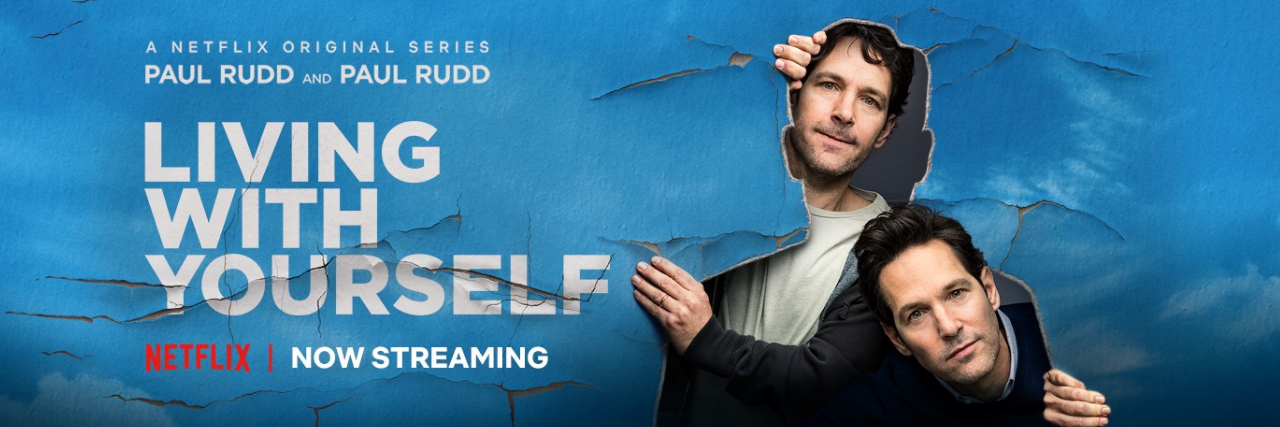Review: Paul Rudd’s New Netflix Show 'Living With Yourself' Captures What It’s Like to Be Split by Depression
This piece contains spoilers for “Living With Yourself.”
I spent this weekend watching the Netflix series, “Living With Yourself,” starring Paul Rudd. The eight-episode series gives you funny, serious, shocking and mental health-related themes all in one. I was immediately hooked by the plot of the story.
Here’s a short summary: The lead character Miles Elliot (played by Rudd) currently hates his life. He hates his job and the fact that he can no longer keep up with daily tasks like he used to. He also hates that he no longer connects with his wife, Kate (Aisling Bea), who resents him because they’re having a hard time getting pregnant. Miles questions his purpose in life.
A co-worker suggests Miles goes to a place called Top Happy Spa in a strip mall. The spa is supposed to leave you feeling like a “being a better version of yourself” — but what they don’t tell you is that they literally make a better version of you. Miles is unknowingly cloned at the spa. Usually the original is killed, but Miles, who wakes up after being buried alive, becomes the first to survive.
When the “Original Miles” finds out, he and “Clone Miles” confront the spa, but Original Miles starts to think this could possibly be a good thing. He decides not to tell his wife Kate and instead asks Clone Miles to go to work while Original Miles stays home. Clone Miles agrees.
Clone Miles loves going to work, cracking jokes, adoring and cooking for his wife and entertaining guests. People start to like Clone Miles better than Original Miles — especially his wife. However, at this point, no one yet realizes it’s a clone, but, of course, notice the big difference when Clone Miles and Original Miles switch.
Eventually, Original Miles grows to hate Clone Miles, who’s seemingly perfect. He hates the fact that even though they’re supposed to have the same DNA, he can’t find a way to be the “best” version of himself like his clone. His wife, who eventually finds out about Clone Miles, admits to the Original Miles she wishes he can be more like the clone. This statement by his wife absolutely hurts Original Miles.
Anyone who has battled their mental health may relate to Original Miles. The battle within can be brutal at times. The Original Miles is like the part of your brain that knows you can do better and have a more “perfect” life — the life of a clone. The life where you can get up out of bed happy every day, always have a great day at work and always have so much energy, but because you’re currently depressed, anxious or suicidal, you cannot currently achieve that — so you hate and resent the other part of your brain (the clone). It’s this idea that there’s a version of you without mental illness who feels “better” and could live a better life — a life without so much stress.
Clone Miles eventually implies that he hates Original Miles as well because he constantly feels Original Miles can be a better person. He also hates the fact the Kate loves her original husband more than him, the clone. He also starts to hate the fact that he may be too perfect and actually starts to have suicidal thoughts. Even though people call him perfect, he starts to fall apart. Both the original and the clone eventually take turns literally trying to kill each other. A line that really stood out to me during a fight between the two was when Original Miles screams, “I hate you,” the clone responds back, “I am you.”
I enjoyed the fact that the series shows the battles we face within ourselves every day. It’s a genius concept that helps us realize even when our mental health is bad, and we feel like there’s a better version of ourselves out there, it isn’t true. Even those with seemingly perfect lives battle a war within. Finding a way to combat those thoughts of unworthiness can be extremely hard for anyone. It doesn’t make you worthless, it just makes you human.
Rating: 
Have you watched “Living With Yourself” yet? Share your thoughts in the comments below.
Lead image via Netflix’s Facebook

